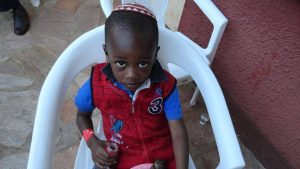 The Judaism that is emerging among African communities is a cutural movement, connected to ancient roots, and proud of its centuries old legacy. African Jews are into experiencing the authentic roots Shabbat, feel the full fledged spiritual heights of the yearly celebration of the Hagim, delve into the depths of mystical lore, take on the message of Pirkey Abot’s sages as true guidance. Still they do not even feel the need to qualify this approach. Simply being Torah loving. What this emerging community is concerned with are specific sets of reality. One of them is racism. It is curious to see people who do not adhere to most Torah criterias be touchy on the issue of Blacks embracing Judaism. They think they can retain the right to call themselves Jews, eventhough they don’t practice any Torah, but also take the position of deciders of who else is Jewish, based on ethnicity. In their eyes, being white naturally allows them such a position over non-whites. To tell you the truth, we African Jews have good laughs about that. It must be the same for Black Christians, or Black Muslims. Of course, anti-Black racists also exist in these groups. These small minded ignorants will never care to know that Christian churches were established in Africa, in Ethiopia, Egypt, and North Africa, centuries before it was solidified in Europe. Nor will it interest them to know that Islam was officially established in Ethiopia even before Arabia. Never mind.
The Judaism that is emerging among African communities is a cutural movement, connected to ancient roots, and proud of its centuries old legacy. African Jews are into experiencing the authentic roots Shabbat, feel the full fledged spiritual heights of the yearly celebration of the Hagim, delve into the depths of mystical lore, take on the message of Pirkey Abot’s sages as true guidance. Still they do not even feel the need to qualify this approach. Simply being Torah loving. What this emerging community is concerned with are specific sets of reality. One of them is racism. It is curious to see people who do not adhere to most Torah criterias be touchy on the issue of Blacks embracing Judaism. They think they can retain the right to call themselves Jews, eventhough they don’t practice any Torah, but also take the position of deciders of who else is Jewish, based on ethnicity. In their eyes, being white naturally allows them such a position over non-whites. To tell you the truth, we African Jews have good laughs about that. It must be the same for Black Christians, or Black Muslims. Of course, anti-Black racists also exist in these groups. These small minded ignorants will never care to know that Christian churches were established in Africa, in Ethiopia, Egypt, and North Africa, centuries before it was solidified in Europe. Nor will it interest them to know that Islam was officially established in Ethiopia even before Arabia. Never mind.
For African Judaism, the fact that Jews were practicing Torah in Africa when there was nothing comparable in Europe, is widely known. When we speak about Torah, it’s about ancestral wisdom that we speak. People can wish to convert, if they do not claim to be carriers of Jewish ascent, but what they will be taught is open to them as human beings. They will learn about a heritage that has very deep African roots. It’s this level of depth we’re interested in. It’s called culture.
Our young Bar Mitzva boys come before their elders. Each elder and male family member
comes and makes a twirl of the Tefilin straps around the young man’s arm.
Each blesses him. He is supposed to remember this moment during his whole adult life, every time he puts on Tefilin. Initiation is essential to us. Girls go through their own initiation rituals into womanhood. All according to their traditions. Lemba, or Igbo, or Amazigh, or Ethiopian Beta Israel, and many more. It would not occur to any of these communities to think the others must adopt their customs to ge acceptable as Jews.
Even if families decide not to inter-marry with other tribes, we dont get ill over it.
We respect the cultural dynamics within each community. What binds us together is our shared love for Torah. This makes us into friends, family, and can even create bonds extending into marriage if there is a wish to do so. But there is no prerequisite condition for being accepted. Because noone should have to be put into such a position.
You love Torah, her laws, her sages, her written and oral legacy ? You are our friend.
We are also bound by our deep commitment for Pan-African developpment.
Every African traditional culture and language must be allowed to take part in the positive development of the whole continent. Until we achieve respect and harmony for and within all African communities. Each Jewish community in Africa seeks to be an inspiration for improvement for all other communities within their own countries. By creating societal models, where high moral standards and achievements are displayed, and practiced. We are proud members of our countries, and we wish to contribute to the welfare of our nations and states. We are confident in the goods Torah can deliver.
They have 3000 years of experience to show. So we are telling our brothers, think twice before you leave the ways of Torah. But even if you do, don’t worry for Torah. In Africa, there will always ge those who will keep it.
Where the roots are kept, the fruits are safe.
